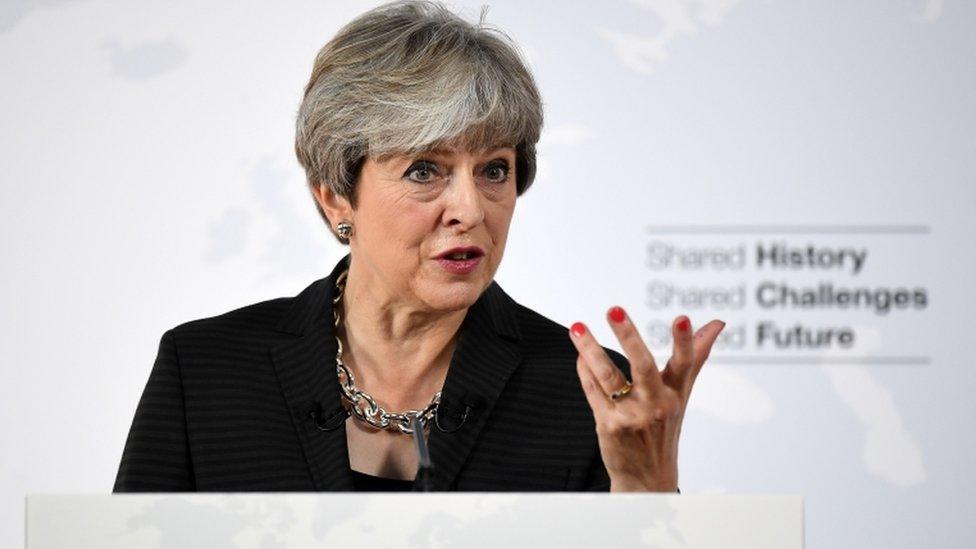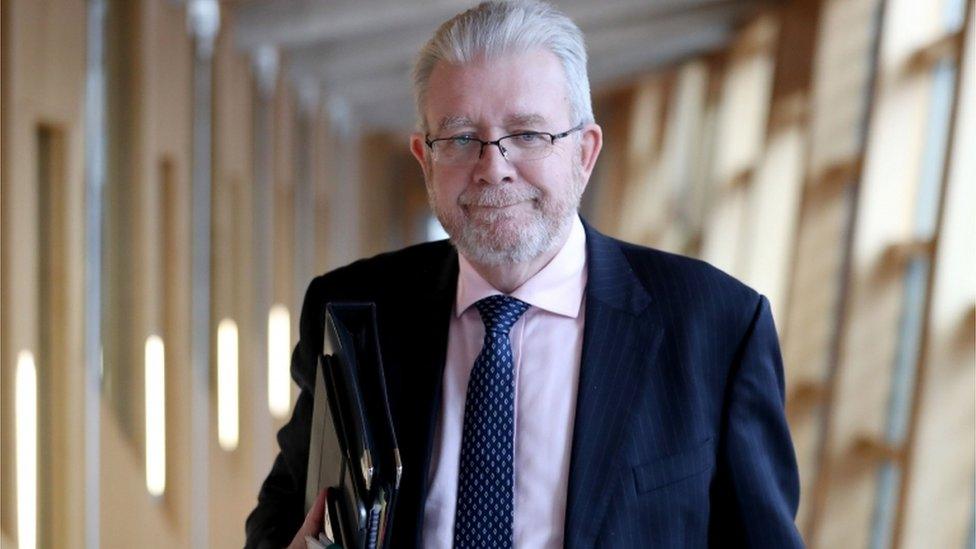Mike Russell welcomes EU single transition period
- Published

Theresa May made the transition period proposal in a speech in Florence
Theresa May's plan to keep the UK in the single market for two years after it leaves the EU has been cautiously welcomed by the Scottish government.
The prime minister used a speech in Florence to set out proposals for the two-year transition period after the UK leaves in March 2019.
Scotland's Brexit secretary Mike Russell said he welcomed the move.
But he said he would continue to push for the UK to secure long-term membership of the single market.
Mrs May's speech in Italy was intended to unblock negotiations over a Brexit deal between the UK and EU, which are due to resume on Monday - as are talks between the Scottish and UK governments over the issue.
As well as trade between the UK and EU continuing on current terms for the two-year transition period, her proposals would see EU migrants being able to live and work in the UK, although they would have to register with the authorities.
Mrs May also said the UK would pay into the EU budget so member states are not left out of pocket.
Speaking to BBC Radio Scotland's Newsdrive programme, Mr Russell said: "I would welcome the move that has taken place, not least because it accepts that the position so far has been wrong."
But he said there would need to be a "further move" towards continuing membership of the single market if the country's interests were to be protected.
'Best solution'
And he said he could not understand why Mrs May had ruled out a Norway-style arrangement, which would see the country leave the EU but retain full, permanent access to the single market through membership of the European Economic Area (EEA).
Mr Russell added: "I do believe continuing membership is still the right decision, and indeed a lot of what Theresa May said today would come to the same conclusion.
"If we are to be such close partners, if we are to be such close friends, I just don't get where the advantage is in coming out (of the single market)."
The Scottish government's preferred option is for the country to remain in the EU despite the Brexit vote - something Mr Russell acknowledged was looking "increasingly difficult".
But he insisted it was still possible to secure continuing membership of the single market, which he said would be the best solution for Scotland and for the rest of the UK.

Mr Russell is due to discuss Brexit with UK government officials in London on Monday
Mr Russell also said many people would have been offended by Mrs May's claim that the UK had never truly felt at home in the European Union.
In her speech, the prime minister said she hoped to build a "comprehensive and ambitious" new economic partnership with the EU in the long term.
This should not be based on existing agreements with Canada or European Economic Area membership, she said, but a "creative solution" should be found to reflect the existing relationship between the UK and EU.
She said that Brexit was a "critical time in the evolution of the relationship between the United Kingdom and European Union".
'Better future'
And Mrs May insisted that if "we open our minds to new thinking and new possibilities we can forge a brighter and better future for all our peoples".
She added: "I look ahead with optimism, believing that if we use this moment to change not just our relationship with Europe but also the way we do things at home - this will be a defining moment in the history of our nation."
The EU's chief Brexit negotiator Michel Barnier described the speech as "constructive" and said the prime minister had shown "a willingness to move forward".
But Labour leader Jeremy Corbyn accused Mrs May and her Conservative Cabinet colleagues of spending more time "negotiating with each other" than with the EU.
He said: "Fifteen months after the EU referendum, the government is still no clearer about what our long-term relationship with the EU will look like.
"The only advance seems to be that the prime minister has listened to Labour and faced up to the reality that Britain needs a transition on the same basic terms to provide stability for businesses and workers."